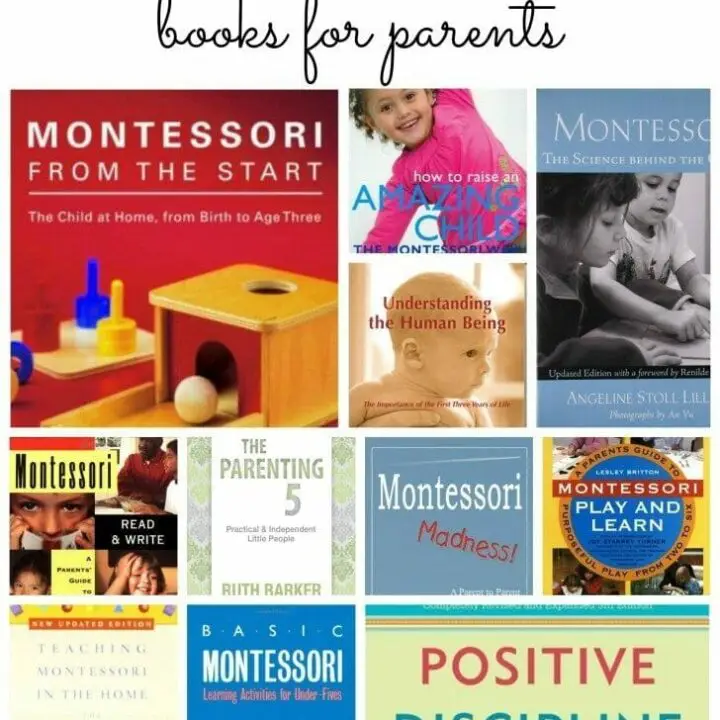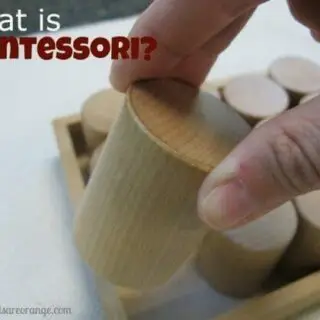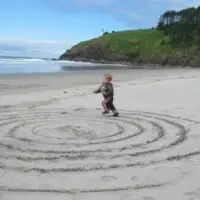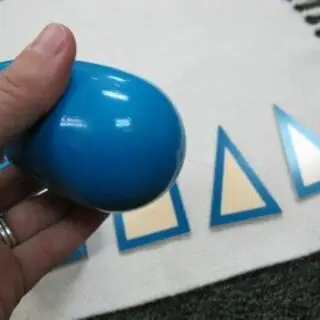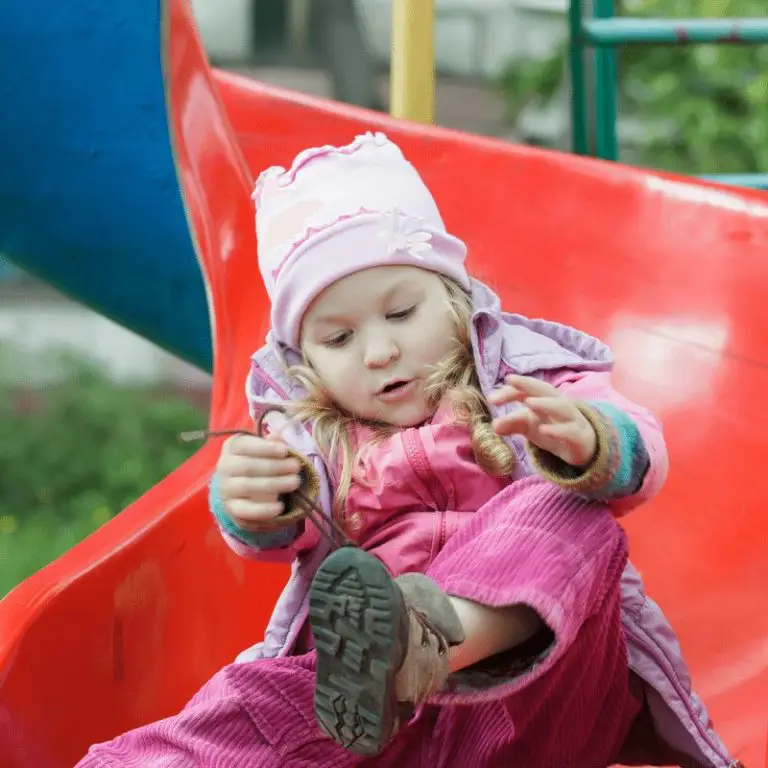Are you curious about Montessori parenting? Are you looking for ways to create a Montessori-inspired home for your child?
You’re in luck! In this post, we will share over 75+ different ways to raise a Montessori kid. We have covered everything from setting up your home to choosing educational materials. Keep reading to learn more.
When my son was 2.5 years old, he hopped off his chair and walked to a cabinet. He pulled out dishes and glasses, ran to the kitchen table, and began setting places for himself and his brothers.
This scenario exemplifies Montessori parenting within the context of Maria Montessori’s Theory.
What is a Montessori Parent?
Montessori for parents is simply applying the Montessori principles and lifestyle at home. A Montessori parent refers to a parent who follows the principles and philosophy of the Montessori educational approach in their parenting style and interactions with their children.
The Montessori method was developed by Dr. Maria Montessori, an Italian educator, and it emphasizes fostering a child’s natural curiosity, independence, and love for learning through a carefully prepared environment and respectful guidance.
Here are some key characteristics and practices of a Montessori parent:
- Respect for the Child: Montessori parents believe in respecting the child as an individual and acknowledging their unique abilities and interests. They treat their children with kindness, patience, and understanding, valuing their autonomy and choices.
- Observant and Supportive: Montessori parents are attentive observers of their child’s behavior and developmental milestones. They provide the necessary support and guidance without being overly intrusive, allowing the child to learn at their own pace.
- Prepared Environment: Montessori parents create a prepared environment at home that is organized, child-friendly, and encourages independent exploration. This environment includes age-appropriate toys, tools, and materials that promote learning and creativity.
- Independence and Responsibility: Montessori parents encourage their children to develop independence and take responsibility for their actions. They allow their children to participate in age-appropriate tasks such as dressing themselves, preparing snacks, or cleaning up after play.
- Freedom within Limits: Montessori parents offer their children freedom within reasonable limits. They set clear boundaries and guidelines, but also allow room for their children to make choices and experience the consequences of their actions.
- Hands-on Learning: Montessori parents engage their children in hands-on learning experiences, providing opportunities for exploration and discovery. They encourage the use of sensory materials and encourage curiosity-driven learning.
- Encouragement of Concentration: Montessori parents understand the importance of concentration and focus in a child’s learning process. They allow their children uninterrupted time to concentrate on tasks or activities that capture their interest.
- Role of the Parent as a Guide: Montessori parents see themselves as guides and facilitators, rather than imposing authority figures. They assist their children in learning new skills and concepts, fostering a love of learning and intrinsic motivation to explore.
- Love of Nature: Montessori philosophy often encourages an appreciation for nature. Montessori parents may expose their children to outdoor activities and nature experiences to foster a connection with the natural world.
It’s essential to note that being a Montessori parent doesn’t necessarily mean adhering strictly to every aspect of the Montessori method. Instead, it’s about embracing the underlying principles and adapting them to fit the unique needs and personalities of each child and family.
How Do I Become a Montessori Parent?
Montessori embodies this act: Respecting the child.
Giving him space and time allows him to grow and develop healthily and productively.
Need a bit of inspiration? Check out these Montessori quotes.

Montessori is a Lifestyle
Montessori is a lifestyle. Dr. Montessori, although she wrote extensively about Montessori as an educational approach, did not intend for this approach to guide children to be limited to the classroom.
Quite the contrary, Montessori, with a focus on the development of the whole child, should embrace the child’s life as a whole, including his time in the classroom and outside the classroom, whether with Mother Nature or at home with family.
Allowing room for a child to lead his development is central to Montessori parenting. How do parents achieve that outcome?
- Giving responsibility to allow for independence by establishing chores and routines using a variety of tools such as specific routines with a daily kids schedule
- Asking children a lot of open-ended questions [here are a few open-ended questions examples]
- Giving space for solitary play

What is Montessori Parenting?
Montessori parenting? Ahh. Yes, it is a thing. Sitting at my laptop one early morning as my oldest son (then a toddler) and my husband slept, I breathed in the silence and began to read an article introducing Montessori.
I stopped and laughed out loud. You see, my family embraced Montessori, only we never knew “it” – my mom’s parenting style – had a name. I was drawn to Montessori immediately and deeply.
When I read the quote, “Never help a child with a task at which he feels he can succeed,” I felt an immediate kindred spirit with Dr. Montessori.
Everything I continued to read about the Montessori philosophy resonated with me as an individual, a teacher, and a parent.
Check out my blog for more detail on Why I Chose Montessori for my family. By the way, here are some of my favorite Montessori books for parents.

Montessori parenting is a big part of the Montessori philosophy. Bridging the gap between home and school is critical to raising a Montessori child. Work with your child’s teachers to make that happen.
Related Post: 12 Ways to Integrate Montessori at Home
Life offers moments to guide children. Let them put on their shoes. Offer them support without doing it for them.
Don’t assume you have the answer or can solve their problem. Children are capable of doing and being so much.
Respecting the potential of our kids to grow and develop based on their instincts and tendencies is just as much a part of the Montessori classroom as it is a part of the Montessori home environment.

Related Post: Your Child is a Killer Communicator
Opening our eyes to that possibility is key to integrating Montessori at home. Montessori theory emphasizes communicating with children, disciplining children, guiding children, and preparing the environment to ensure child development success.

75+ Ways to Montessori Parenting
- Read Montessori: a Modern Approach
- Embrace the idea that Montessori is a lifestyle and not simply an approach that begins and ends at classroom doors
- Invest in stools so the child can reach the sink, cabinets, and shelves
- Use real dishware; Avoid plastic toys, cups, dishes
- Embrace the Montessori Coat Flip
- Practice simplicity
- Be a model of behavior no matter what you’re doing in life
- Help a child with scientific thinking
- Think about history not in dates to remember but instead as a sense of duration and passage of time (which typically isn’t cognitively possible to comprehend until 7 or 8 years old). Teaching kids about time can be fun!
- Use REAL images (aka AVOID cartoons)
- Hang a coat rack at your child’s level
- Allow kids to be creative
- Consider a faucet extender
- Create a culture basket
- Wait for your child to put his coat on
- Give your child space and time to put on his shoes
- Practice Letter Writing
- Explore the outdoors with these books about rocks, ants, bears, and seeds.
- Teach kids to code (Maria Montessori would approve of moving along with the times)
- Focus on sounds, not memorization of letters
- Use concrete objects that kids can get their hands on while learning
- Teach children about what it means to be courageous
- Read up on positive discipline and respectful parenting
- Learn about ways to encourage children to write
- Create the environment for the discovery of reading and writing
- Practice observing your child for at least five minutes a day
- Don’t intervene in conflict or struggle
- Remember Practical Life is about focus, completing a work cycle, preparation for writing, and independence.
- Cook with your kids
- Put together an easy Letter Sound Work for your kids
- Always move left to right
- Allow your child to zip up on his own
- Make smelling bottles
- Don’t talk down to your child.
- Speak in a kind, firm tone.
- Have a Family Reading Time
- Learn photography with your kids
- Subscribe to one of these amazing monthly kits
- Read (a lot) with your child
- Establish a routine with kids
- Commit to these 5 Rock Star Responses to Kids during Challenging Moments
- Create a music basket
- Learn about Electricity with Kids
- Learn the 3 Period Lesson
- Create object boxes
- Expect a lot from your child because she is capable
- Take Sensorial Activities outside
- Leave her room to develop at her pace
- Allow him to make his discoveries because then he will be a lover of learning for life
- Go and be outside
- Practice Mindfulness
- Implement yoga into your daily routine with your kids
- Listen to your kids
- Kneel at the child’s eye level when speaking with him
- Use phrases other than “What’s Wrong?”
- Learn math outside
- Better communicate with your child with these rock-star tips
- Don’t be afraid of insects
- Take Language activities outside
- Help create a sense of awe and wonder in a child by using questions to lead learning.
- Garden with Kids
- Make time for dinner & family time
- Practice grace & courtesy
- Create a peace table in your home
- Accept that all children exist on the education spectrum.
- No two children are alike
- Children crave a gentle, calm leader
- Focus on developing a child’s emotional intelligence
- Be a role model in your relationship with your partner
- Do listening activities with kids
- Take Practical Life Outside
- Purchase garden tools for kids
- Practice inquiry-based learning
- Read Madeline Levine’s book “Teach Children Well” about redefining success.
What are your biggest struggles with being (or wanting to be) a Montessori parent? If you didn’t already get enough, check out 15 Best Montessori Quotes for Parents.
Montessori 101
Marnie



